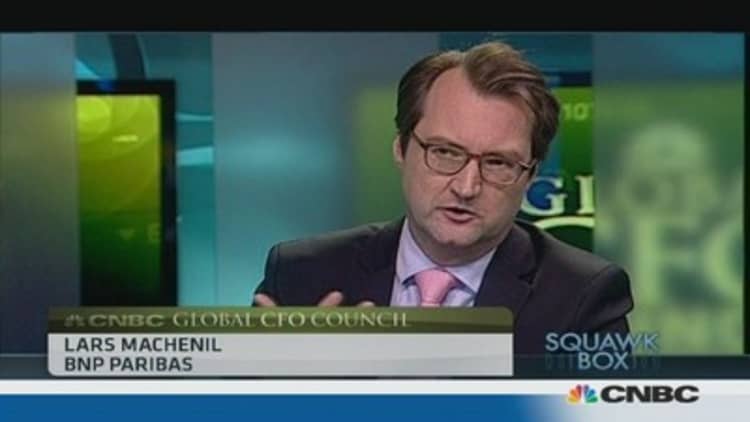
The uncertainty and delay surrounding the European banking union needs to end if lenders are to shake off "the shackles on growth," the chief financial officer of BNP Paribas told CNBC.
"In terms of regulation risk, there is still a lot of uncertainty and I would argue that what is really important is that they allow banks to focus on implementing the regulation that is already there instead of tweaking proposals," Lars Machenil told CNBC.
Europe's shaky banks have been at the heart of the euro zone's financial crisis of confidence. Governments struggling to keep down their deficits have had to sell more debt to prop up their lenders, which also buy the bonds.
In June 2012, European leaders agreed to set up a European banking union to put an end to this co-dependency. However, European governments have clashed over how far regulation should go – particularly over who should have the final say over rescuing and winding down banks.
(Read more: Germany blamed for banking reform delays)
Despite his criticism of "tweaking" the rules, Machenil agreed that regulation was needed to "whip banks into shape" and a single supervisory system was "just what the doctor ordered."
"It will lead to transparency, efficiency and will break down borders and, in the end, probably take off the shackles on growth. I think it is essential in restoring confidence in the banking sector."
As part of its expanded role as Europe's banking supervisor, the European Central Bank has laid out the conditions for a region-wide banking stress test to ensure lenders can withstand future economic shocks. This is on top of the regulatory agreements (known as Basel III standards) to boost consumer and investor confidence by strengthening their so-called "core tier 1 capital."
Mechanil said BNP Paribas had "adapted very quickly" to new rules. "Like whipping off a Band-Aid quickly which is much better than taking it off slowly, our adaptation plan has been done very quickly and we have a very strong core equity tier 1 leverage ratio."
In October, BNP Paribas reported third-quarter net profit which beat expectations, although the French lender highlighted weak trading at its fixed income unit in which revenues were down 27.1 percent compared to the third quarter of 2012.
The issue has been highlighted by other European banks too as global interest rates tick higher and bond prices lower as the U.S. Federal Reserve looks to taper its quantitative easing program that has suppressed yields.
(Read more: BNP Paribas revenue hit by weak fixed income trading)
Despite the decline, Machenil said that fixed income would remain a "very important cornerstone of banking activity" particularly in Europe.
"As Europe voted on the Basel III accords and wanting to deleverage the banks but at the same time wanting to ensure that households and companies do get the financing that they need to grow. If banks cannot provide that financing, it will have to be the debt capital markets."
(Read More: BNP Paribas profit falls, expands in Germany)
"In order to jump-start that capital market, you need to have a full range of fixed income activity in a bank."
- By CNBC's Holly Ellyatt, follow her on Twitter @HollyEllyatt






